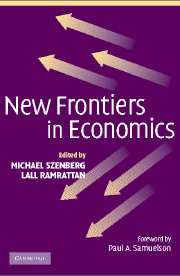Book contents
- Frontmatter
- Contents
- List of Contributors
- Foreword by Paul A. Samuelson
- Preface
- Acknowledgments
- Introduction
- PART I INFORMATIONAL BEHAVIORAL ECONOMICS AND FINANCE
- 1 Information and the Change in the Paradigm in Economics
- 2 Behavioral Economics
- 3 Experiments with Financial Markets: Implications for Asset Pricing Theory
- 4 Two Puzzles of Asset Pricing and Their Implications for Investors
- PART II MACROECONOMICS AND PUBLIC POLICIES
- PART III INTERNATIONAL TRADE AND DEVELOPMENT
- PART IV CONTRACTS, LAW, AND GAMING
- Author Index
- Subject Index
- References
3 - Experiments with Financial Markets: Implications for Asset Pricing Theory
Published online by Cambridge University Press: 06 July 2010
- Frontmatter
- Contents
- List of Contributors
- Foreword by Paul A. Samuelson
- Preface
- Acknowledgments
- Introduction
- PART I INFORMATIONAL BEHAVIORAL ECONOMICS AND FINANCE
- 1 Information and the Change in the Paradigm in Economics
- 2 Behavioral Economics
- 3 Experiments with Financial Markets: Implications for Asset Pricing Theory
- 4 Two Puzzles of Asset Pricing and Their Implications for Investors
- PART II MACROECONOMICS AND PUBLIC POLICIES
- PART III INTERNATIONAL TRADE AND DEVELOPMENT
- PART IV CONTRACTS, LAW, AND GAMING
- Author Index
- Subject Index
- References
Summary
INTRODUCTION
This essay surveys experiments of financial markets that were designed with the competitive paradigm in mind. The results will be analyzed from a particular theoretical angle, namely, asset pricing theory. That is, we discuss to what extent a given financial markets experiment can shed light on the validity of asset pricing theory.
Modern asset pricing theory has strong roots in economics and probability theory. Its models are logically compelling, and the derivations elegant. Many models are widely used in industry and government, in applications of capital budgeting, industry rate regulation, and performance evaluation, among others. Yet, there is surprisingly little evidence in support of the theory, and what has come forth is controversial. But tests of asset pricing models have almost exclusively been based on econometric analysis of historical data from naturally occurring markets. That type of empirical analysis is very difficult, because many auxiliary assumptions (homogeneous, correct ex ante beliefs, stationarity, unbiased samples, and so on) have to be added to the theory for it to become testable.
Experimentation would provide an alternative means to verify the principles of asset pricing theory, because many auxiliary assumptions are under the control of the experimenter. That is, experimentation provides one way to gauge the validity of what would otherwise remain mere elegant mathematics. This essay reports on what has been accomplished so far.
Not all experiments on financial markets were designed with the idea that they should verify theoretical principles. Often, the link with the theory is vague.
Information
- Type
- Chapter
- Information
- New Frontiers in Economics , pp. 103 - 127Publisher: Cambridge University PressPrint publication year: 2004
